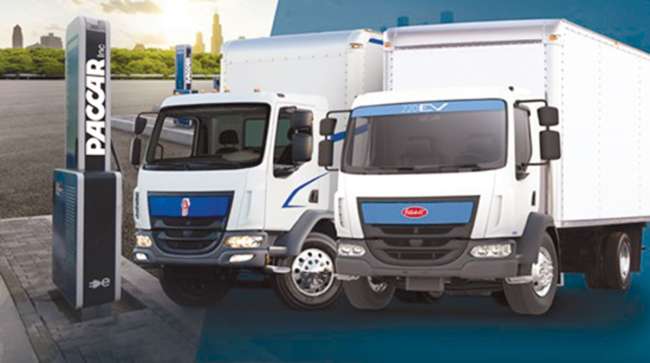Senior Reporter
Paccar Parts Begins Selling Electric Vehicle Chargers

[Stay on top of transportation news: Get TTNews in your inbox.]
Paccar Parts announced it is making available to customers electric vehicle charging stations designed to be compatible with Paccar Inc.’s Kenworth Truck Co., Peterbilt Motors Co. and DAF electric trucks.
One industry expert called it a needed step.
“It is very complex, so you just can’t leave it up to the fleets to do it themselves,” Mike Roeth, executive director of the North American Council for Freight Efficiency, told Transport Topics. “Bringing it into the business relationship is really helpful to the fleets that are trying to figure it out.”
The cast of characters involved in truck electrification, Roeth said, will involve a utility, truck builder, charging-equipment provider, project management and construction services to get power to the site. Also, another party likely will be involved in electrical storage.

Roeth
“Ten years from now, this is going to be a lot more mature. The fleets are going to want to buy separate services [not bundled]. But we are so far away from that, we shouldn’t be talking a whole lot about that.”
Meanwhile, customers can purchase the chargers from Kenworth, Peterbilt and DAF dealers and TRP store locations worldwide, choosing from multiple DC fast chargers rated up to 920V DC. These electric vehicle charging stations also will work for other EV commercial vehicles, including vans and buses, according to Renton, Wash.-based Paccar Parts, a unit of Paccar Inc.
Paccar Parts is involving Faith Technologies and Schneider Electric in the rollout.
Established in 1972, Faith Technologies, based in Menasha, Wis., is involved in electrical planning, engineering, design and installation.
Schneider Electric, a French company whose roots date to 1836, is involved in software, critical power and smart grid applications.
Paccar expects the medium- and heavy-duty market for electric trucks will be in the hundreds of units a year in 2021. Then, in four or five years, as regulatory requirements take hold, that market will become thousands per year and claim 1% of the replacement market.
Kenworth and Peterbilt in September began taking customer orders for production model Kenworth K270E and the Peterbilt Model 220EV battery-electric trucks. They each are cabover, medium-duty models.
Full production of the vehicles is scheduled to begin this year, the company reported in its third-quarter earnings call.
“We offer a tailored approach to charging solutions that include best-fit options with charging levels from 20 kilowatts up to 350 kilowatts charging power,” said Chris Scheel, Paccar Parts senior director of marketing.

How can we control an unruly trucking tech stack and streamline fleet management practices? Host Seth Clevenger speaks with Ray Greer, CEO of Omnitracs, which acquired SmartDrive last year. Hear a snippet, above, and get the full program by going to RoadSigns.TTNews.com.
The 20 kW charger option is a UL-certified DC wallbox and intended for commercial parking and fleet or dealership service facilities. It is designed to be easy to install and ideal for vehicles with extended dwell times.
The 50 kW model supports the daily operations of an individual truck for medium- and heavy-duty fleets. The charger has integrated connected services for remote monitoring, diagnostics, statistics and firmware updates.
The 120 kW and 180 kW chargers are for fleets operating multiple routes or even multiple shifts in urban use. The 180 kW unit has enough power to charge most trucks in less than four hours.
All the charging stations are backed by a two-year warranty and include a radio-frequency identification (RFID) reader for user authentication and cellular connection with a two-year cellular service plan. A two-year service level agreement is included with the chargers.
Paccar Parts is a global network of more than 2,200 Kenworth, Peterbilt and DAF dealers and TRP stores.
At the same time, another industry executive suggested despite the “enthusiastic stream of press releases” from truck makers regarding the future of electric trucks, very serious challenges and questions remain — especially for vocational trucks.
To understand the challenges, follow the money, said Andrew Taitz, the majority owner and chairman of GVW Group, parent company of truck maker Autocar. Founded in 1897, it is the oldest surviving motor vehicle brand in North America. The company manufactures heavy-duty, severe-service trucks used in refuse, construction, concrete, road maintenance applications plus yard tractors.
“Major vocational truck manufacturers sell and distribute through a traditional dealership model,” Taitz said. “At an average dealership, the new-vehicle department accounts for less than 26% of gross profit. The other 74% of profits are coming from their parts and service business.”
He noted:
- Electric engines are the primary slowing mechanism for vehicles, reducing wear on brakes and need for replacement — every three years as opposed to three months.
- Electric engines lack the fuel and engine-related parts that need periodic attention.
- Computers and electronic components replace fuel-driven engines.
“The leap to building an electric over-the-road truck to building an electric vocational truck is quantum,” Taitz added.
Roeth agreed.
On refuse trucks, for example, the packer and arm would need to be electrified.
“A refuse truck is very complex in terms of where electric loads need to happen. I agree with [Taitz] that we may be rushing a little bit about some of these conclusions about what is going to go electric earlier rather than much later.”
Want more news? Listen to today's daily briefing:
Subscribe: Apple Podcasts | Spotify | Amazon Alexa | Google Assistant | More

